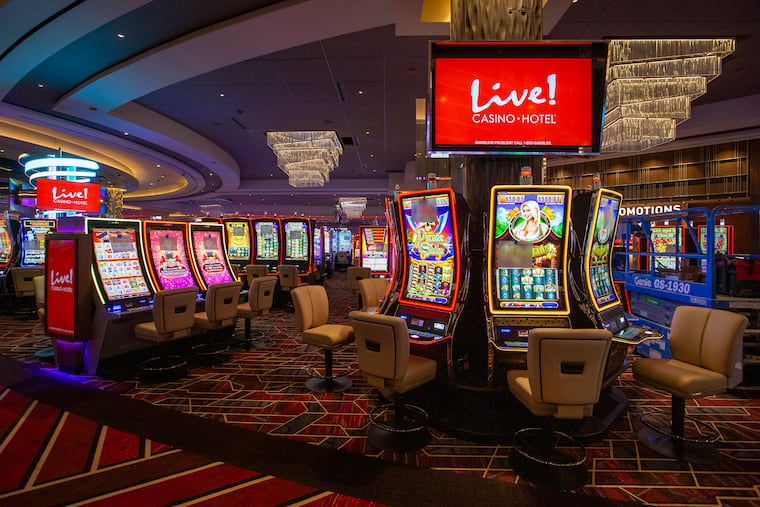Pa. gaming revenue is on a roll, but not at the casinos
Pennsylvania reported a record $432.5 million in gambling revenue in November, up 48% from pre-pandemic numbers. Almost all the growth was from online gaming and sports betting.

Pennsylvania reported a record $432.5 million in gambling revenue in November, up 48% from pre-pandemic numbers two years ago and the eighth straight month of elevated revenue following the widespread rollout of COVID-19 vaccines.
Almost all of the growth over the last two years has been in new online forms of gaming, including such casino games as slots and blackjack, and also sports betting. Online gaming and sports betting were authorized under a 2017 expansion of Pennsylvania’s gaming law.
Retail revenue from brick-and-mortar casinos — slot machines, table games, and in-house sportsbooks — was up only 3.6% since November 2019. Four new casinos have opened in the last two years, so the slightly larger revenue is now spread among 16 properties, including three mini-casinos, up from 12 casinos operating in 2019.
The opening last year of the Live! Casino & Hotel Philadelphia in the city’s stadium district has apparently cannibalized customers from Harrah’s Philadelphia Casino & Racetrack in Chester, Rivers Casino in Philadelphia, and to a lesser extent, Parx Casino in Bensalem.
Across Pennsylvania, slot machine revenue is down 2% from two years ago. But at Harrah’s, slot revenue was down 32% from November 2019, and at Rivers Philadelphia, slot revenue sank by nearly 28%. At Parx, slot revenue was down 9% from November 2019.
Revenue from table games such as blackjack, roulette, poker, and craps, which is about half the money generated by slot machines, is up 11% statewide since 2019. But it fell 25% at Harrah’s. Rivers Philadelphia and Parx reported increases in table games revenue in the last two years.
The scenario unfolding in Pennsylvania is not dissimilar to that in New Jersey, where total gaming revenues are up, but Atlantic City casino operators say the transition to internet gambling is mostly benefiting online gaming operators and sportsbooks. They say physical casino operations and their employees are suffering.
The New Jersey Legislature this week rushed through tax relief for the casinos that is awaiting a signature from Gov. Phil Murphy, who has indicated his support.
In Pennsylvania, in-person gaming at casinos accounted for 64% of total gaming revenue in November, down from a 91% share two years ago.
Casino revenue appears to have been impacted in several states where internet gambling is legalized — Pennsylvania, New Jersey, Delaware and West Virginia, said Roger Gros, publisher of Global Gaming Business Magazine in Nevada. Michigan also launched internet gaming this year.
But Gros does not think that online gaming is entirely responsible for flat-lining casino revenue. Some casino customers may have not returned because of the coronavirus, he said. And younger gamblers whom casinos are trying to attract prefer table games over slot machines.
“I don’t think it’s really bad news for casinos because it really does diversify the revenue that they get,” he said. “If, God forbid, there’s another pandemic lockdown, they’ll still have revenue coming in through the online side.”
The November gaming numbers also do not reflect any impact that the omicron variant may be having on casino traffic. Gros said Las Vegas hotel reservations for New Year’s Eve are strong. “I don’t think it’s impacting anybody so far,” he said. “People are just tired of it, and who knows what this omicron thing is doing when it comes to how severe it is.”
The addition of online gaming has upended Pennsylvania’s ranking of casinos by revenue source, which Parx Casino has led for years. Parx still generates the most revenue from brick-and-mortar operations.
But when online revenue is included, the list is topped by Hollywood Casino at Penn National, whose online gaming platform is operated by DraftKings, followed by Valley Forge Casino Resort, which has formed a partnership with FanDuel. DraftKings and FanDuel are the dominant sports-betting operators, and also offer casino gaming.
Most of the growth in Pennsylvania’s gaming activity can trace its roots to the state’s sweeping gaming-expansion legislation in 2017, which created mini-casinos and allowed sports betting and betting online and on video terminals at truck stops. The credit-rating agency Moody’s Investors Service said at the time that the new betting options were likely to cut into casino business.
“While the state finances may benefit from this bill, it is less clear to what extent existing operators in the state will actually benefit,” Moody’s said in a 2017 report.
Indeed, Pennsylvania’s state coffers have experienced robust growth in tax revenue from the upsurge in gaming. Pennsylvania generated $171.9 million in tax revenue in November from gaming, up 44% from pre-COVID November 2019.
In the last 12 months, Pennsylvania has captured $1.8 billion from gaming taxes, some of which is channeled to local governments.